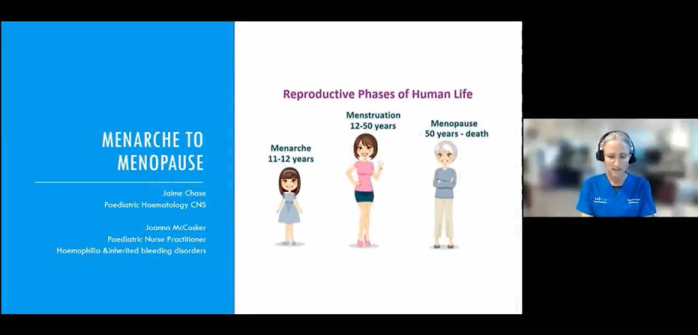JAIME CHASE
Jaime Chase is the Haematology Clinical Nurse Specialist at the Children’s Cancer & Haematology Service, John Hunter Children’s Hospital, Newcastle NSW
Women and Girls
Chair, introduction and personal story ~ Sharron Inglis
Understanding, recording and reporting bleeding symptoms in girls and women ~ Jaime Chase, Joanna McCosker
New clinical approaches in managing women and girls with bleeding disorders across the lifespan ~ Dr Mandy Davis
Gynaecological issues for women and girls with bleeding disorders ~ Dr Angela Dunford
Sport and exercise for girls and women ~ Hayley Coulson
The session regarding women and girls commenced with a personal story by Sharron Inglis, an Australian community leader, and raised some interesting questions about society’s perspective on women with bleeding disorders. Advocacy, support and education were highlighted as her most important messages.
Heavy periods can negatively impact on physical, emotional and social quality of life and reduce work capacity – so how can we fix this?

Joanna McCosker and Jaime Chase discussed the importance of normalising the conversation around periods as they commence and as a woman moves through her lifespan to menopause. The session included:
7 – Over 7 days is too long for a period to last
2 – Soaking a pad or tampon in 2 hours or less is not normal
1 – Passing clots the size of a $1 coin is not normal
Further information is located at:
Dr Mandy Davis discussed new clinical approaches in managing women and girls with bleeding disorders across the life span, concentrating on the available treatments for bleeding issues, how to treat low iron and diagnostic difficulties that women may face.
Dr Angela Dunford discussed how challenging menarche can be for a young woman with a bleeding disorder. The causes of abnormal menstrual bleeding can differ greatly across the lifespan and this must be taken into consideration before treating. Hormonal treatments for young women are evolving and there are options available to help control the issue of heavy periods or heavy menstrual bleeding.
Finally, Hayley Coulson discussed the importance of sport and exercise for young women and how to do this safely and in a controlled way. Importantly, she discussed what to do with an injury and when to seek further help.
Haemophilia Foundation Australia acknowledges the Traditional Owners and Custodians of Country throughout Australia, the land, waters and community where we walk, live, meet and work. We pay our respects to Elders past and present and extend that respect to all Aboriginal and Torres Strait Islander peoples.
Sign up for the latest news, events and our free National Haemophilia magazine